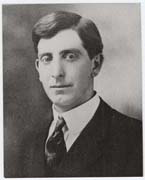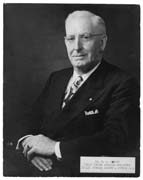
In 1914, an idealist from Indiana became principal of Citrus Union High School after five years with the Chino schools, two years as vice-principal at Chaffey Union High School, and graduate study at the University of Chicago. He had a preacher's license, was well-versed in English and American literature, and held strong views about education, democracy, public school finance, and many other issues. He was also compassionate and cared deeply for his family and the students and staff at his high school. He was destined to run Citrus with an iron hand for the next 31 years, longer than any individual before or since.
Floyd Hayden's daughter, Margaret Hayden Rector, remembered her father as a feisty, methodical, indefatigable, affectionate father, attentive to details, and tightfisted with the district's money. A typical day had Hayden up early, feeding the chickens, shoveling coal into the furnace, and doing any other chores that needed doing at his home in Azusa. He then dressed for work and spent the day at Citrus. In the evening, it was quite usual for the parents of students who were having problems stopping by to talk.
Hayden held strong beliefs and lived by them, even to the extent of living in a city and a section of that city that his boards of trustees and most of his teaching staff thought undesirable. He kept the institution's controls firmly in his hands and insisted that his faculty behave how he believed they should, both in school and in the broader community.

Pursuing his strongly felt ideals of education and democracy, Principal Hayden pushed for a junior college. California law had permitted the creation of two additional years on high school campuses as early as 1907. Hayden had heard the philosophy and seen the practice of junior colleges when he was a graduate student at the University of Chicago. Finally, Hayden got his wish when, on June 5, 1915, at about 7:30 in the evening, the board voted to establish Citrus Junior College.
Citrus was the eleventh junior college formed in California and the fourth in Los Angeles County. However, with Long Beach discontinuing junior college courses in 1916, Hollywood in 1919, Los Angeles and Placer in 1920, San Diego in 1927, and Santa Barbara in 1928, Citrus College has the distinction of being the fifth oldest junior/community college in California and the oldest in Los Angeles County.
Clark, Alfred Paul.
Citrus Speaks. Glendora, Calif. : Citrus Alumni Association and Citrus College Foundation, c. 1994.
